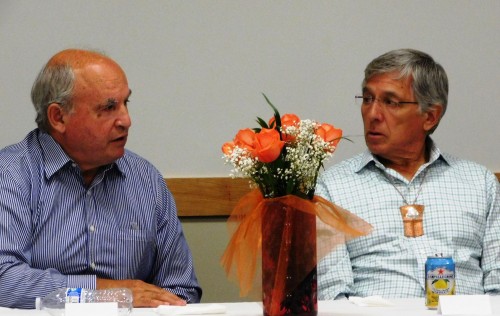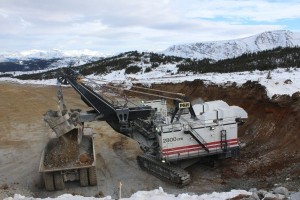
British Columbia Mines Minister Bill Bennett, left, and Alaska Lt. Gov. Byron Mallott talk at a dinner at Juneau’s Walter Soboleff Center in August. Mallott is preparing a transboundary mining agreement to submit to B.C. (Photo courtesy of the governor’s office)
Alaska officials have drafted an agreement aimed at protecting transboundary waters. They say it will address concerns about pollution from mines on British Columbia rivers that flow into Alaska. But critics say it may not make any difference, because it has no teeth.
Audio PlayerLt. Gov. Byron Mallott presented what’s being called a “Statement of Cooperation” to the first meeting of his citizens’ advisory group on transboundary mining. It has not been sent to B.C. officials.
It details ways Alaska and British Columbia can protect watersheds from what it calls “the adverse impacts of development.” That includes mining, increased marine traffic and other activity.
The draft agreement proposes cooperative water quality monitoring, more input into mine permitting and a larger role for Alaska tribes and Canada’s First Nations.
Department of Environmental Conservation Commissioner Larry Hartig said it’s aimed at protecting the Alsek, Stikine, Taku and Unuk rivers.
“We’re looking at not just protecting the main Southeast watersheds from these particular mines,” he said.

Mining began earlier this year at the Red Chris, an operating mine in the Stikine River watershed. (Photo courtesy Imperial Metals)
“But, as far as we can see going forward, we want to put something in place that will be there today, tomorrow and through different administrations. We’re trying to build something here that’s going to protect the waters over the long haul.”
The advisory work group is made up of about 16 fishing, resource development, tribal and environmental advocates. Most who spoke applauded the effort and the administration’s focus on transboundary mining.
But Chris Zimmer, of the group Rivers Without Borders, says it has no real power.
“My worry is that how do make this document have the teeth where it actually does force B.C. to change things on the ground, that commitments made are actually honored,” he said.
But according to Mallott, that can’t happen in this kind of agreement.
“Any such working relationship between the state of Alaska and a foreign government, essentially, cannot be legally binding without it being a treaty – I’m not sure that that’s the word – that has to be ratified by both federal governments,” he said.
Mine critics say that could happen if the state takes the issue to the International Joint Commission, or IJC, a U.S.-Canada panel addressing cross-border water issues.
That would require a referral from the U.S. State Department, which has said it’s not interested.
But Heather Hardcastle of the group Salmon Beyond Borders said the state should still pursue the option. She said the IJC could address cumulative impacts of multiple mines.
“That is one thing of many that the IJC could look at. And if we don’t ask for Secretary Kerry to ask for the IJC to be involved, we certainly won’t get the IJC involved or the State Department involved right now,” she said.
The draft agreement with British Columbia makes no reference to the commission.
But Mallott said it’s not off the table. He said the draft is a step toward a document to present to the B.C. government. And the advisory board’s job is to suggest changes and additions.
He said many of its elements have already come up in talks with provincial officials during the past year.










